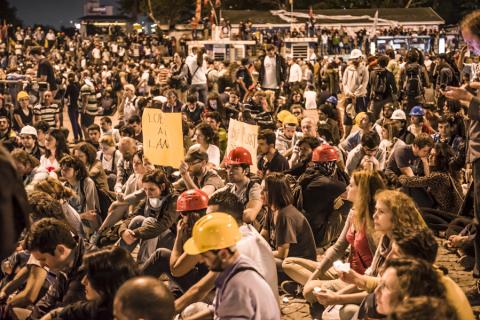Over the past few weeks, Turkey has been rocked by unrest. The protests were sparked by peaceful resistance to the destruction of Istanbul’s Gezi Park in Taksim Square, the only green public place in central Istanbul, which was going to be turned into a shopping mall and historical recreation of Ottoman Artillery Barracks.
A harsh response from the state, characterized by extreme police brutality, has ensued in response to what have become the largest demonstrations the country has seen for decades. Protests have now spread to 77 cities in Turkey.
For years, tensions have been growing between women and gay rights groups, environmentalists, secularists—including trade unions—and Prime Minister Tayyip Erdogan and his Justice and Development Party (AKP), which controls the government.
Engin Sedat Kaya, a labor activist in Turkey’s textile sector, said:
These protests represent a great accumulation of anger against the government’s increasingly repressive policies—bans on abortion, on alcohol and anti-democratic policies against trade unions and workers. It is even a reaction to the extremely arrogant tone in Prime Minister Tayyip Erdogan’s speeches.
For 20 days, demonstrators have faced excessive beatings with police batons and rifle handles, excessive use of tear and pepper gas, water cannons shooting water laced with chemicals, flash bombs, rubber bullets and allegedly real bullets. So far, five have died and 7,000 have been injured.
On Sunday, a funeral was held for Ethem Sarisülük, a working-class labor and political activist and an Alevi—a religious minority in Turkey—who was killed last week by a police bullet that was recorded on video. Police attacked his funeral attendees with water cannons. Sarisülük’s case has been deliberately suppressed from media coverage and his family was not allowed into his autopsy.
The extreme reaction by police to the initial protest in May has sparked a mass movement in civil society against authoritarianism and for democracy. The labor movement has played a prominent role in this movement in recent days by mobilizing its members to action to preserve the rights of citizens in an evolving Turkey.
Today, the Confederation of Public Workers’ Unions (KESK) and the Confederation of Progressive Trade Unions (DISK), along with three professional organizations of architects, engineers, doctors and dentists, have announced a one-day work stoppage to demand an end to police violence. In Istanbul today, police did not allow DISK’s march to take place into Taksim Square.
The Council of Global Unions, which brings together 11 global union federations and represents hundreds of millions of workers worldwide, wrote a letter to Prime Minister Erdogan that cited both the current violence and the bloodshed of this year’s May Day celebrations in Istanbul and said, “The global union movement is concerned that your government has turned violent repression into a regular practice….Such brutality is unacceptable.”
The Istanbul Gezi Park protests have been coordinated by a broad coalition called “Taksim Solidarity,” which is composed of 117 different constituent groups, including trade unions.
This prominent stand has not gone without retaliation. Prime Minister Erdogan told hundreds of thousands of supporters at a government-organized rally outside Istanbul on Sunday that the protesters were manipulated by “terrorists.” Erdogan also has criticized foreign media and has vowed to “identify one by one those who have terrorized the streets.”
The president of the Turkish Medical Association reported that five doctors and three nurses had gone missing on Saturday after treating injured protesters. Amnesty International has launched a campaign against incommunicado detention of protesters. Lawyers were detained en masse last week when they tried to stop the first massive police attack on Taksim Square.
Despite promises from the Turkish government to respect a court decision that stopped the construction of the shopping mall in Gezi Park, police invaded the Taksim Square and Gezi Park en masse. Subsequently, extreme violence has consumed the streets of Istanbul and other cities across the country. Military police, or “jandarma,” have joined the civilian police in the attacks.
The DISK and KESK union confederations have played a major role in the demonstrations that have captured the world’s attention this May and June. Already, KESK held a one-day strike on June 5, criticizing the government’s “terrorist response” to peaceful protests. DISK also struck, and DISK organizers have been at the center of the Gezi Park protests.
For decades, these two union confederations have supported respect for fundamental human and labor rights in Turkey. KESK, in particular, has been a leading voice for equality and respect for Kurdish rights in Turkey. As a result, it has experienced constant government raids in recent years. Both the leadership and rank-and-file members have been and continue to be detained under false charges of promoting “terrorist propaganda.”
That is why this protest movement is such an important struggle for Turkey’s labor unions. It is not just Gezi Park that is at stake, but also the ability of Turkish civil society to thrive free of government intimidation. Indeed, according to many veterans of the Turkish labor movement, workers’ rights in Turkey stand to rise or fall with the fortunes of the Taksim Square protesters.
“Turkey’s trade unionists stand in solidarity with the protesters in Taksim Square, because we have stood-down these authoritarian practices, tear gas and rubber bullets so many times ourselves in the past,” said Eylem Yildizer, a 10-year veteran of both the labor and political movements in Turkey. “This is a turning point for young people active from the beginning of these protests. We will not stand silent and be victims of these government attacks. These protests give new meaning to the way we form a nation. It is only the beginning of what we can achieve. We want freedom for everyone.”
The AFL-CIO supports these Turkish labor federations’ call for immediate end to the brutal police crackdown in Turkey. AFL-CIO President Richard Trumka sent a letter to Prime Minister Erdogan supporting the demands of the unions.


Spread the word